Harmonic Tremor
Harmonic tremor is a slow steady wave, or periodic pulse, that looks similar to a seismograph signature though with distinct
differences. Long period events are similar to harmonic tremor, but with an even slower waveform. Harmonic tremor is not
caused by an earthquake, but is caused by the movement of magma or superheated water within the volcano. Harmonic
tremor is a signature that often portends a pending volcanic eruption.
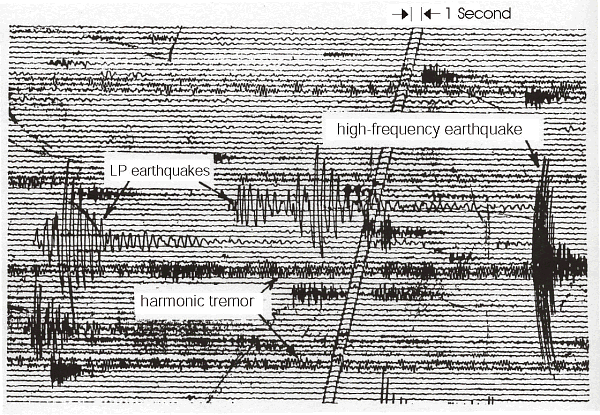
Harmonic Tremor
http://earthquake.usgs.gov/learning/glossary.php?term=harmonic%20tremor
- Harmonic tremor describes continuous rhythmic earthquakes that can be detected by seismographs. Harmonic
tremors often precede or accompany volcanic eruptions.
-
- Long Period Event
http://www.pbs.org/wgbh/nova/volcano/seis_lpe.html
- The shaking that causes LP events is similar to the "water hammer" that happens in household water pipes.
When water is moving quickly through a pipe and the faucet is turned off, the water is forced to stop. But
instead of coming to an abrupt stop, it bounces against the closed valve, creating a wave of pressure that
moves back and forth within the pipe. This bounce causes the pipe to clang loudly. The same thing happens
within a volcano's magma channel, except that the channel's end is already closed, and the abrupt change is
caused by variations in the magma's pressure. Also, the frequency of the bounce is much slower within the
channel.
Harmonic tremor appeared on Mount Saint Helen's seismographs the month before the last eruption. Harmonic tremor has
also been evident at Yellowstone, though this also occurred in 2003 when no eruption occurred at Yellowstone. Compare the
tremors recorded prior to the Mount Saint Helen eruption to those ongoing at Yellowstone, recorded at the Red Lodge and
Bozman seismograph machines. Long Period trace is evident at Bozman.

SOURCE: http://www.movermike.com/wp-content/uploads/2008/12/jun_ehz_uw2004112012.gif
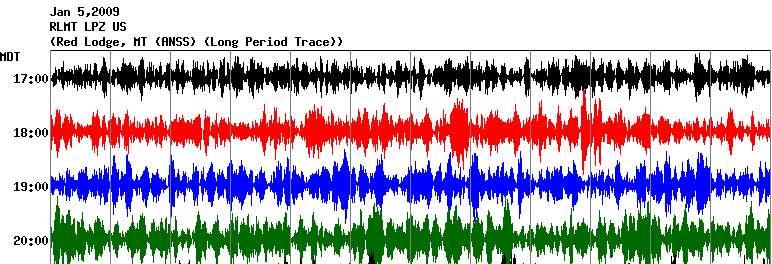
SOURCE: http://mbmgquake.mtech.edu/earthworm/wavef_disp/RLMT_LPZ_US.2009010500.gif

SOURCE: http://mbmgquake.mtech.edu/earthworm/wavef_disp/RLMT_BHZ_US.2009010400.gif
Yellowstone is currently classed by the USGS as having a Volcano Alert Level of green, meaning it is not expected to erupt
nor is it even considered to be at a caution level of yellow. But those following this closely have noted a delay in posting
earthquakes above a magnitude 1 or 2, and earthquakes seem to disappear from the lists. A long running thread on the
GodlikeProduction forum contained this transcribed conversation with a University of Utah analyst on January 5, 2009
regarding harmonic tremors and the delay in updating earthquake lists. Is there a cover-up, with the establishment worried
about public panic? The analyst rather obviously evades a question about harmonic tremor.
I just called the U. of Utah and spoke to an analyst and I questioned him on almost every topic that is
currently happening in Yellowstone Lake/Caldera and he gave me somewhat a run around.
Q: Why is there information withheld from the public on YS seismograph readings and earthquake
charts?
A: The current seismic charts only stay up for week.
Q: No that is not what I'm asking, my question is about the recent data from Saturday and Sunday that
has been withheld from the public on your website of the current events of Yellowstone Lake.
A: Oh we are so behind gathering the information with the current activity we have just been really
busy.
Q: What about the Harmonic patterns that were consistent for a week at YS Lake/Caldera doesn't it
mean something?
A: (He paused for a minute.) With current data you will see that YS has not had current earthquakes.
(He completely answered with a different answer.)
The water level on Yellowstone lake has also been rising, despite the area being under freezing temps. This is measured by the
outflow at the lake outlet, which is increasing in flow rate despite the lack of snowmelt. This could mean that the water is being
heated, thus melting ice on the lake or swelling the water, or could mean that the lake bottom is heaving up. And an uplift in
land north of the lake over recent years is palpable.
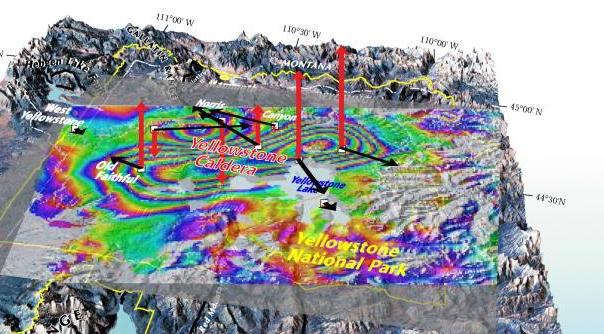
Does this mean that an eruption is pending? Per the Zetas, yes, but this will not be a supervolcano eruption, nor will it be
sudden. Prior to the last weeks when the Zetas predict a volcanic eruption at Yellowstone, we can anticipate Yellowstone to
do some oozing, replacing the hot water gushing with lava gushing, but with no violent eruptions prior to the last weeks.
ZetaTalk Prediction 1/3/2009: Yellowstone is unique in that water is part of the process, with overheated water and
steam being regularly released from the caldera - the famous Old Faithful geyser and similar tourist spots. Are the
harmonic tremor vibrations thus caused by magma on the move, or simply water under pressure attempting to find an
outlet? This pattern, of the almost continuous jiggle, has shown up repeatedly over recent years, without an eruption.
Thus, park officials and geologists assigned to monitor the situation are loathe to sound the alarm and look silly when
nothing results from a restless period. Perhaps a new geyser is being born -- something as benign as that. The
problem with failing to sound the alarm is that if this is magma on the move and an eruption is imminent, no warning
will have been given to the public. The tremors are being caused by both water, steam pressure and magma on the
move. Yellowstone has many existing outlets for magma to travel upward, however, unlike the typical volcano which
has perhaps only one vent. Plugged, this single vent must blow to release pressure. For Yellowstone, we predict a slow
eruption, where hot water and steam begin to be replaced by magma, at many vent points. The magma that will be
ejected into the air will settle as ash, unlike water vapor which condenses into rain. The current quake swarm is
indicative of breaking rock, opening a pathway under the lake. This will be one of many vents whereby magma finds
an outlet in the near future. About this we cannot be more specific.
Caldera Eruptions
The Zetas have long stated that Yellowstone will not erupt like a supervolcano, but will behave only like an ordinary erupting
volcano during the last weeks prior to the pole shift.
ZetaTalk Prediction 5/30/2004: We have stated that Yellowstone will become an active volcano during the pole shift,
but will not meet the fear of many that it will become the super volcano that it was in the past. It is more to ooze than
blow and will give plenty of warning well before it starts to ooze which we do not expect to be until the Earth is
grinding to a halt during rotation stoppage. Right now the West Coast volcanoes, including Yellowstone, are
increasingly worrisome but this is being held back from the public because the government does not want to explain
how Global Warming is causing all this. Its all tied together. The cover-up is so tightly interwoven that everything
that would point to the existence of Planet X and the cover-up is held back. But when it gets to the point where it is
worrisome there will be no denying it, because local people will begin talking about it. Treat it like any other volcano
with respect to when you should move away and the worry about being down wind and out of the way of the lava
flows.
Per the Zetas, what prevents Yellowstone from behaving like a supervolcano is the subduction of rock layers on the West
Coast. These rock layers have created a buffer from rising magma. This can be seen on maps showing the Continental Divide,
which traces through Yellowstone's caldera. There is not far to go before the Continental Divide lies to the east of the caldera,
giving the Yellowstone vents even more of a buffer from rising magma.
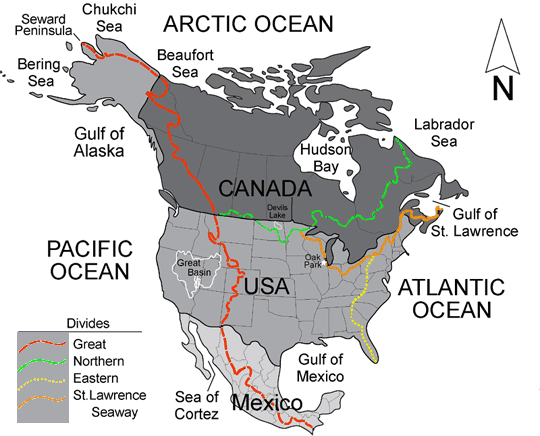
ZetaTalk Prediction 12/5/2003: We have indicated in the past that Yellowstone would not be exempt from erupting
during the pole shift, and this still stands. But the eruption will not be what many fear. It has evidence of being a
super volcano at a time when the world was in complete global turmoil, not due to a pole shifts but due to impacts
and being careened out of its orbit and closer to the Sun. The injury to the crust so deep it almost reached the core. So
clearly that was an exceptional situation, not this situation. What should be born in mind is that this is a subduction
area, with layers of the North American Plate pushing all the way to the Continental Divide. Even though
Yellowstone lies in an area which is a hot spot, there's enough crust flakes overlapping that it is not just a direct
siphon of lava to go kaboom in an explosion. But it will cause ash for some 100 miles in all directions, bad enough
that life may be snuffed in those areas. So we would recommend anyone wanting to survive the shift itself, not to be
close to Yellowstone but to allow a 100 miles buffer.
But unlike their prediction for Yellowstone, the Zetas have predicted a potential eruption in the Long Valley caldera at
Mammoth Lake in California. This eruption would accompany a rupture in the fault line running from San Diego/LA to
Mammoth Lake.
ZetaTalk Prediction 2/15/2000: It is no secret that Mammoth Lake and the caldera of Yellowstone are warming up,
and the populace has been prepared for these occurrences by the movie Volcano where there, in the middle of LA,
lava is bubbling up. In fact, there is a fault line running from the approximate San Diego/LA area, up into the Sierras,
and this is liable to rupture rather violently during one of the quakes that precedes the pole shift by some months.
Volcanic eruptions from that area in the Sierras can be expected.
New Madrid Booms
If Yellowstone's quake swarm started on December 26, 2008 the rest of the country was experiencing rock stress as well,
right around the same time period. Primarily on December 31, 2008 booms were heard across the eastern half of the US in
Georgia, Iowa, Missouri, South Carolina, and Indiana.
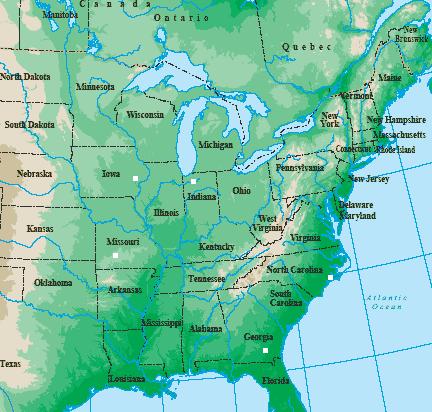
- BOOM! Did You Hear That?
December 31, 2008 http://www.theblacksheartimes.com/articles/2008/12/31/news/doc495a677743ba0246658259.txt
- Pierce County, Georgia. If it had only been a couple days earlier, maybe it could have been blamed on Santa's
sleigh backfiring. A mystery boom that rattled windows and startled residents around the county just after 8
p.m. Saturday remains just that: A mystery. Pierce County 911 fielded about a dozen calls in roughly a
five-minute span not long after the sound echoed through the area. One Blackshear resident described the
sound like "two trains crashing." Despite the noise, however, no crash or no mess was left to be found, just
speculation by those who heard it. The "boom" shook homes and was reported from the southern end of the
county up to the Otter Creek community. The Jacksonville airport, the military said it had nothing flying. The
National Weather Service also had no ideas. It remains a mystery.
-
- Loud Boom Still Unexplained
Dec 23, 2008
http://www.individual.com/story.php?story=93937944
- Mysterious booms heard south of Burlington [Iowa] Saturday night have many residents scratching their
heads. Law enforcement dispatchers said residents in Wever, West Point, Fort Madison and Keokuk reported
hearing a loud noise - strong enough to shake a house - between 6:30 and 7 p.m. followed by other lesser
booms at varying times Saturday night. Law enforcement officials have theories about what caused the sounds
but no concrete answers. But no munitions are tested after dark by American Ordnance, which operates and
maintains the plant. Another theory was that the sound was a sonic boom caused by a plane breaking the sound
barrier. However, Federal Aviation Administration said records Saturday showed no military or domestic
aircraft in the area.
-
- Loud Booms Wake up Neighbors Near CU Power Plant
December 31, 2008
http://www.ky3.com/news/local/36928084.html
- Springfield, MO--Several loud booms were heard coming from the Southwest Power Station Plant near James
River Freeway Wednesday morning. A CU spokesman says it was likely a steam safety valve opening, workers
are checking it out.
-
- Source of Noise Not Determined
December 31, 2008
http://www.charleston.net/news/2008/dec/31/source_noise_not_determined/
- A loud boom startled residents east of the Cooper River on Monday and left police officials and weather experts
stumped. Mount Pleasant [South Carolina] police received a few calls about the noise around 2 pm. The
National Weather Service in Charleston had no reports of atmospheric activity that would have caused the
boom, and the U.S. Geological Survey's National Earthquake Information Center recorded no seismic activity
in the area.
-
- Quickly's Neighbors/Porter County
December 31, 2008
http://www.post-trib.com/news/quickly/1353674,pquickly-brf.article
- I live just outside Wheeler and I heard those booms everyone is writing about. How can they be ice hitting the
house if we all heard that noise in different areas at the exact same time? One morning there was no wind, and
I heard and felt another big boom rattle my house. There have been smaller bangs that could be ice, but I doubt
the big house-shaking ones are ice hitting my house.
If there is anything consistent about the locales where the booms occurred, they are all locales that were affected by the
1811-12 New Madrid Fault line adjustment. Quakes went north from the New Madrid area into the Great Lakes area,
skipped over the solid rock of the Appalachian Mountain area, but ran up the coastline to South Carolina and even ran bells in
Boston.
ZetaTalk Warning 3/3/2007: The New Madrid adjustment will affect so much area, in a domino manner, that it will
not be a single large quake, but a series, separated by weeks and months. The primary adjustment will be within days,
after shocks for weeks, but months later still, adjustments. The New Madrid is associated with fault lines that run up
toward the Great Lakes, Chicago will adjust and rupture, Ohio will be pulled in places, and as we have explained, the
land to the West of the Mississippi will sink in places. There is a known fault line that runs from the center of the Gulf
up along the East Coast, thus the effect in 1811-12 in the Carolinas and DC on up to Boston.
You received this Newsletter because you Subscribed to the ZetaTalk Newsletter service. If undesired, you can quickly Unsubscribe.
|

